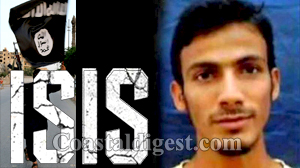New Delhi, Jun 16: Fugitive chief recruiter for terror group ISIS in the Indian subcontinent Mohammed Shafi Armar was today named a Specially Designated Global Terrorist by the US.
The US State Treasury Department, while updating its list of Specially Designated Global Terrorists (SDGT), has included in it Armar, a native of Bhatkal in Karnataka, clearing the way for sanctions against him.
An Interpol Red Corner notice is also pending against the 30-year-old Armar, who has many aliases like 'Chhote Maula', 'Anjan Bhai' and 'Yousuf al-Hindi'.
Armar's name has now been added to the Office of Foreign Assets Control of the US Treasury Department which enforces economic sanctions programmes, primarily against countries and groups of individuals, such as terrorists and narcotics traffickers.
The sanctions can be either comprehensive or selective, using the blocking of assets and trade restrictions to accomplish foreign policy and national security goals of the US.
Armar was said to have left for Pakistan along with his elder brother after crackdown on Indian Mujahideen cadres.
After a fight with Bhatkal brothers, including Riyaz, the founder of IM, in Pakistan, Armar is believed to have created Ansar ul Tawhid, which later pledged its allegiance to the ISIS.
There have been many reports of him having been dead in a drone attack or crackdown by the allied forces. However, every time intelligence agencies began giving credence to such reports, his name or voice cropped up in intercepts.
Tech savvy, Armar has been operating on Facebook and other personal messenger services to contact, brainwash and recruit youths from India, Bangladesh and Sri Lanka.
His links to the ISIS were also the highlight of the interrogation of Yasin Bhatkal, who was arrested near the Nepal border in 2013.
Shafi Armar first came on the radar of investigation agencies when the NIA was probing suspected ISIS cadres in Ratlam of Madhya Pradesh.
During the interrogation of alleged IS operatives, it emerged that Armar was motivating and radicalising Muslim youths in India. He was said to have been recruiting youths for the Jund ul Khalifa-e-Hind through online radicalisation.
The NIA had charge-sheeted him along with five others for allegedly conspiring to carry out terror strikes in the national capital and also during ardhkumbh in Haridwar.
The National Investigation Agency had told a special court that these accused were planning to assemble Improvised Explosive Devices (IEDs) using extracts from "match sticks".
The United Arab Emirates had deported three Indians who were allegedly working for Armar.
It emerged during the interrogation of IM suspects that he was a self-proclaimed ally of Abu Bakr al-Baghdadi, chief of the ISIS.




Comments
So sad, youngsters falling prey to religious extremism.
Add new comment